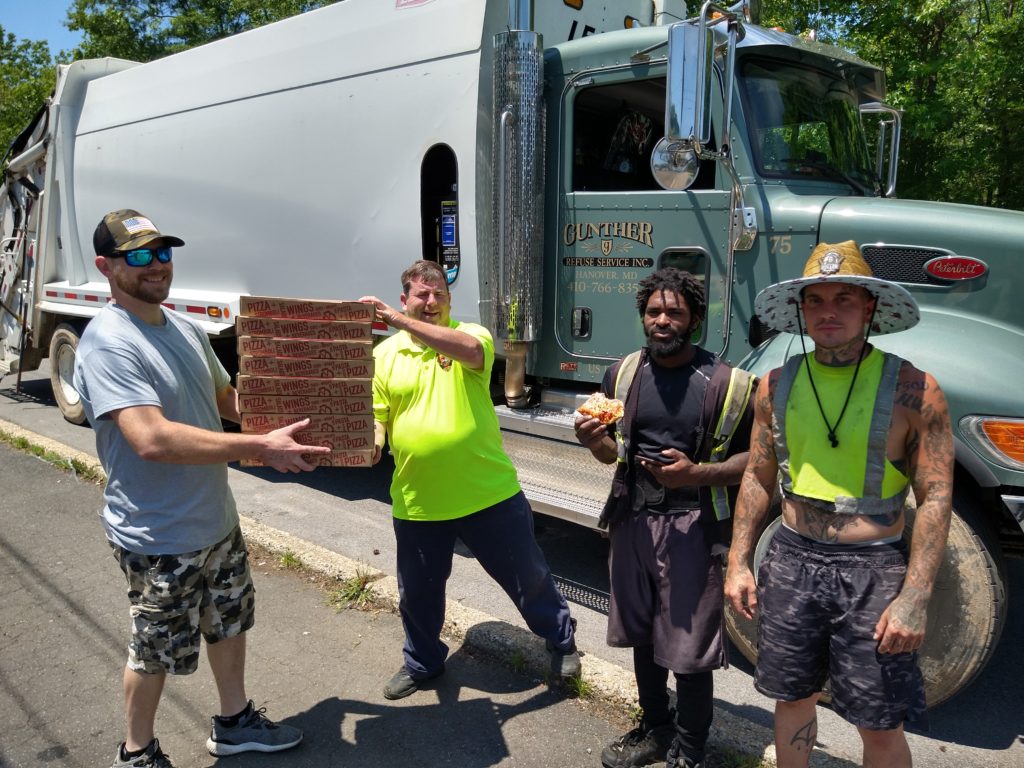Cleaning Up for Chesapeake Country

By Matt Liptak
An essential job that sometimes goes unappreciated was recognized last week on the Mayo peninsula. What was previously known as National Garbage Man Appreciation Day, now called Waste & Recycling Workers Week, is a time for American communities to stop and recognize some of the unsung heroes of their neighborhoods—waste collection workers. The residents of Mayo showed their appreciation by providing Pizza Bolis pizza, paid for by two anonymous donors, to some of the Gunther Refuse Service crews that work the area.
“It’s these guys,” said Bob Hay, who drives Truck 75. “These guys on the trucks—how they do it all day long I have no idea. They knock it out. That’s what gets it done—those guys.”
Working through the pandemic was especially challenging this past year for the company’s employees. Their days got about two hours longer on average because of a surplus of trash, perhaps from people staying at home. And there has been a manpower shortage in the industry, Hay said.
“This last year it’s been really heavy,” says driver Rebekah Chandler of Laurel. “We have a lot of hard workers.”
Gunther employs about 90 workers on 30 trucks with three-member crews. They start at 6 a.m. and finish between 1 and 3 p.m. Over the course of four days, Hay’s crew collects trash for about 11,000 homes, in Mayo, Edgewater and Riva.
Waste collection is a community effort, but often a quiet relationship between residents and those who serve them. Getting the job done as seamlessly as possible requires effort from both parties.
Chandler said many residents on her route are appreciative of Gunther’s workers. “I like the driving, and I like a lot of the patrons we serve,” she said. “We have a lot of good patrons down here and they take care of us. When I’m missing, they ask where I am.”
The day the pizzas were handed out had been a particularly hot one. Much of this season has already been sweltering for workers. “It was hot and heavy,” collector Wesley Hill said. “Usually down here it’s always heavy. It’s pretty steady. We get a lot of trash—couches, furniture.”
His fellow collector, Paris Ford, added that there are physical challenges to the job. “It’s not easy,” he said. “They overflow the trash cans.”
Hay stressed that it makes the job of waste collection easier on employees when residents tie up their garbage bags and secure the lids of garbage cans and bins.
Some residents will give workers drinks or snacks during their routes. It’s a welcome gesture since collectors like Hill and Ford use up a lot of calories just in their first hours of the day. They often fill the 16-ton trucks to capacity—all through hard labor.
What’s their secret? Hill, a former high school athlete explained. “I just built my stamina up and my endurance,” he said. “It’s more mental than strength.”
Waste collection is a fundamental service necessary for all communities, says Hay. Folks like Paris, Wesley, Hay and Chandler are essential, not just during pandemics, but every day, every year. Mayo residents wanted to make show these men and women are appreciated every time they haul away their weekly waste.
“The community down here wanted to reach out and recognize that day,” Hay said. “With the heavy volume increase from COVID-19 we saw a lot of people with signs thanking us for what we do.”
